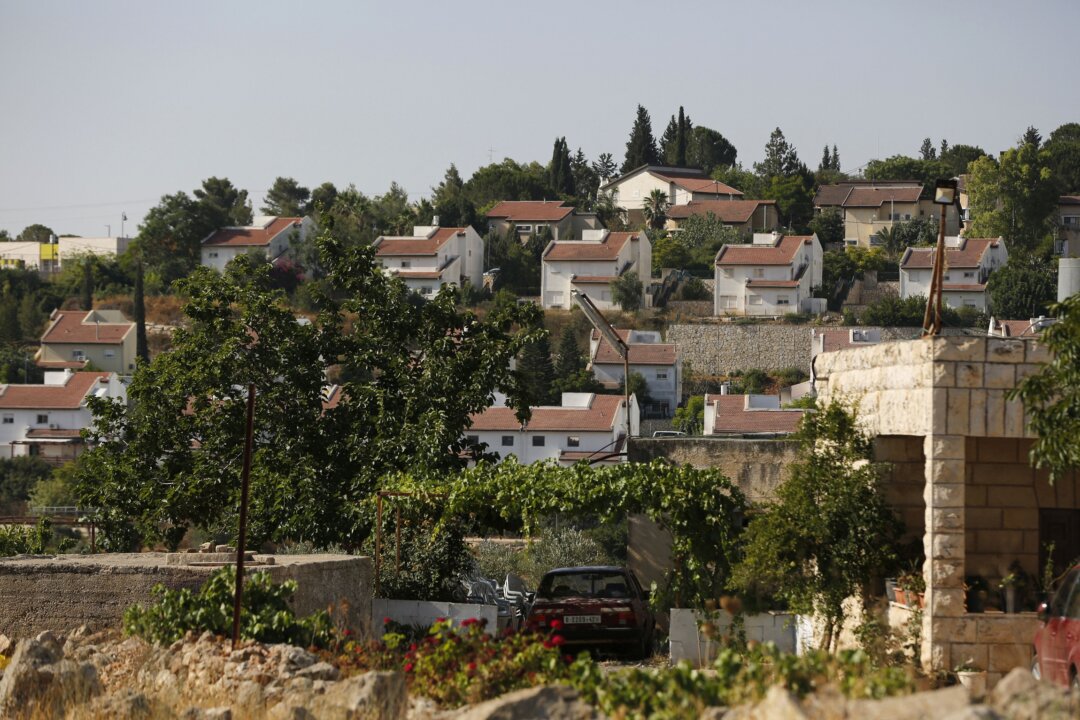The U.S. government called on Israel to hold West Bank settler activists accountable for violence and the forced displacement of Palestinians there.
The State and Treasury departments announced new sanctions on Nov. 18, targeting Israeli settler activists accused of perpetuating violence in the disputed West Bank.
“The United States is taking action today against three entities and three individuals for their roles in violence targeting civilians or in the destruction or dispossession of property. Their actions, collectively and individually, undermine peace, security, and stability in the West Bank and the safety of both Israelis and Palestinians,” State Department spokesman Matthew Miller said on Nov. 18.
The State Department named Itamar Yehuda Levi, Shabtai Koshlevsky, and Zohar Sabah as the three individuals.
The State Department identified Levi as the owner of Eyal Hari Yehuda Co., a firm accused of assisting in the expansion of various Israeli settlements in the West Bank, including the U.S.-sanctioned Meitarim Farm project. The company is also accused of supporting other entities previously sanctioned by the United States. As of Nov. 18, Eyal Hari Yehuda Co. is facing new U.S. sanctions designations.
According to the State Department, Koshlevsky is the vice president, project coordinator, and co-founder of the nonprofit organization Hashomer Yosh, which the U.S. government designated to be sanctioned earlier this year.
The State Department said Sabah has targeted Palestinians and Palestinian homes in the West Bank with violence and destruction. Sabah was also allegedly involved in a settler attack on the Al-Ka’abneh Elementary School in Jericho, in the West Bank, in September. Several Palestinians at the school were injured.
While the State Department sanctioned Eyal Hari Yehuda Co., Levi, Koshlevsky, and Sabah, the Treasury Department announced new sanctions targeting a West Bank settler association known as Amana and an Amana subsidiary, Binyanei Bar Amana Ltd.
The Treasury Department said Amana maintains ties to various individuals whom the U.S. government has previously sanctioned for engaging in violence in the West Bank.
“The settlers and farms that Amana supports play a key role in developing settlements in the West Bank, from which, in turn, settlers commit violence. More broadly, Amana strategically uses farming outposts, which it supports through financing, loans, and building infrastructure, to expand settlements and seize land,” the Treasury Department stated.
The Epoch Times reached out to the Israeli Ministry of Foreign Affairs for comment but did not receive a response by publication time.
Israeli settlements in the West Bank have been a longstanding point of contention in the Israeli–Palestinian conflict, with opponents arguing these settlements increasingly encroach on territory claimed by the Palestinian people and undermine efforts at a two-state solution.
The Biden administration has called efforts to expand Israeli West Bank settlements “counterproductive” to peace in the region. The administration has announced multiple rounds of sanctions over the past year, targeting settlers accused of engaging in violence in the West Bank.
Many countries view Israeli settlements in the West Bank as inconsistent with international law. In 2019, the first Trump administration abandoned the previously held U.S. position that the settlements violate international law. The Biden administration has since stated that the settlements run contrary to international law.
The new round of sanctions comes with just weeks left before Trump returns to the White House.
Some Israeli settler activists have signaled hope that Trump’s return will bolster their efforts to claim territory in the West Bank.
Reuters and The Associated Press contributed to this report.

